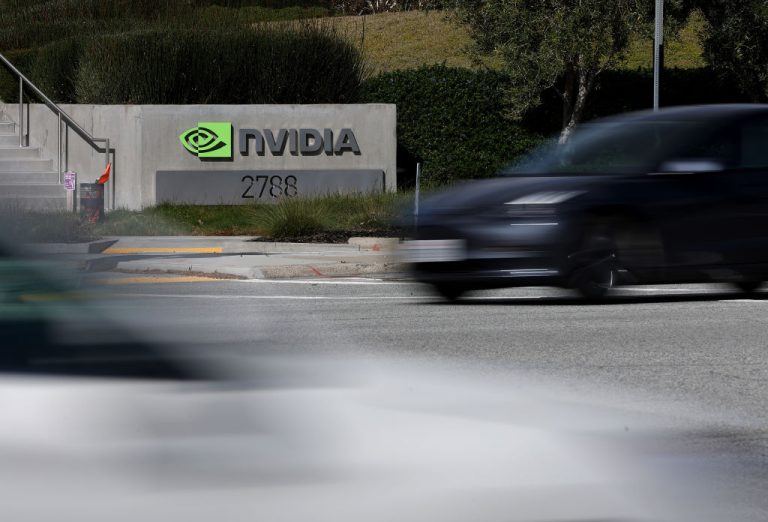U.S. media dropped a bombshell on the equities market on June 27 when The Wall Street Journal announced mere minutes after trading closed that the Biden administration is getting ready to more comprehensively ban exports of NVIDIA processors widely being used to facilitate artificial intelligence to mainland China.
NVIDIA enjoyed a healthy 3 percent rally before closing the day at $418.76, along with the slumping Nasdaq tech index, which finished up nearly 2 percent.
However, both NVIDIA and its key index failed to recover from an intense sell off that encompassed the previous day’s trading on Monday, June 26.
When the news hit, the company lost another 3 percent in post-market trading, printing a low of only $405.18.
MORE ON THE NEW IRBO POLICY OF “DE-RISKING” FROM CHINA
- Apple Will Make 5G Parts On US Soil With Broadcom
- Senate Bill Adds Tariff to Small Consumer Imports From China, Proceeds Will Fund Made-in-America
- Biden Calls Xi a Foolish Dictator After Blinken’s Diplomatic Efforts
The decline is significant in that NVIDIA has enjoyed the most extreme rally in the company’s history on the back of a recent wave of AI hype campaigns. After opening the year at a low of $140.34, NVIDIA rallied from $272.40 in May to a high of $439.90 set on June 20.
Success
You are now signed up for our newsletter
Success
Check your email to complete sign up
Before The Wall Journal Journal released its report, NVIDIA was still valued at slightly over $1 trillion USD.
The Journal’s article cites anonymous insiders, who are specifically paraphrased as leaking that the Department of Commerce “could move as soon as early next month to stop the shipments of chips made by Nvidia and other chip makers to customers in China and other countries of concern without first obtaining a license.”
Sources stated the move will be a fortification of semiconductor export restrictions against the People’s Republic of China (PRC) that were laid out in October 2022, shortly before both the U.S. and Chinese markets printed their lows of the year.
Previously, the October restrictions allowed NVIDIA to circumvent the measures in the form of an A800 chipset that runs at only 70 percent the capacity of the hotly demanded A100 because the measures simply capped the speed of chips that can be exported to Chinese Communist Party companies.
A May 7 review of the A800 by enthusiast magazine Tom’s Hardware stated, “Nvidia is among the main beneficiaries of the AI megatrend, which is why its GPUs are in such high demand that even the cut-down A800 is sold out in China.”
But perhaps most notable about the announcement is a component that is not directly related to chip purchases.
On June 21, Foreign Policy published a piece reporting on how Mainland tech firms are circumventing the ban, not by importing A800s or any form of United Front Work Department overseas collection campaigns, but by renting cloud computing from international data centers.
FP wrote, “Despite being blacklisted for human rights abuses, state-backed artificial intelligence firm iFlyTek has been renting access to controlled NVIDIA chips via the cloud. There is little practical difference between using a physically exported chip and using a chip ‘virtually’ through the cloud. However, this practice is currently completely legal, even for firms like iFlyTek.”
The sensitivity is more amplified when in March, Yicai Global quoted NVIDIA CEO Jensen Huang as stating, “We are partnering with cloud service providers in Europe and the US to offer the capabilities of Nvidia’s DGX supercomputer system, powered by eight of its flagship A100 or H100 chips” to Mainland companies in a personal interview with the outlet.
WSJ stated their sources told them the White House is “considering restricting” cloud computing offerings in the salvo of new bans as well.
But Communist China’s companies are resourceful, if not unscrupulous.
On June 20, Reuters reported on an international smuggling campaign where, from within a skyscraper in Shenzhen described as one “whose first 10 floors are crammed with shops selling everything from camera parts to drones” that although A100s “are not advertised,” that “asking discreetly works.”
But the black market isn’t cheap, Reuters said. While an A100 normally retails for about $10,000 USD, the smugglers require $20,000.
The smuggling problem was actually reiterated during the June 27 U.S. equities market session by the South China Morning Post, which referenced a Shanghai engineer with the surname Tang as telling reporters, “He is among thousands of unofficial intermediaries sourcing Nvidia’s high-end GPUs to meet the demand from various Chinese tech firms now developing ChatGPT-like services.”
Notably, the Post also cited a Shenzhen vendor who told them that not only are the A100s sold on markup actually modified, but that it is “very difficult, if not impossible” to acquire a set of 8 proper A100s to use for AI training.
WSJ says the ban is not likely to come into effect until after Secretary of Treasury Janet Yellen visits Beijing in July “to avoid angering Beijing,” based on comments from its sources.
The move is not one that CEO Huang is a fan of. He speculated in comments to Financial Times in a recent interview that Washington’s export controls will cause “enormous damage” to the overall industry and has left NVIDIA with its “hands tied behind our back.”
It appears that some company insiders may have anticipated the move was coming. Fox News reported on June 22 that one Board Member who has been seated since 2008 sold $50 million worth of shares just days earlier.
SEC filings show the man sold more than 118,000 shares between June 16 and 20, while Jensen Huang sold 10,456 shares on June 21.
NVIDIA share prices traded for no less than $420.80 during that period.
5 other company officers accompanied Huang in sales during the same timeframe.













